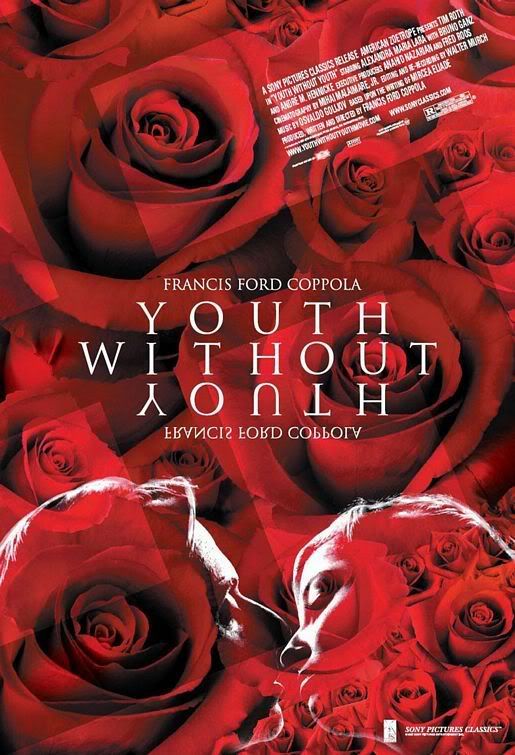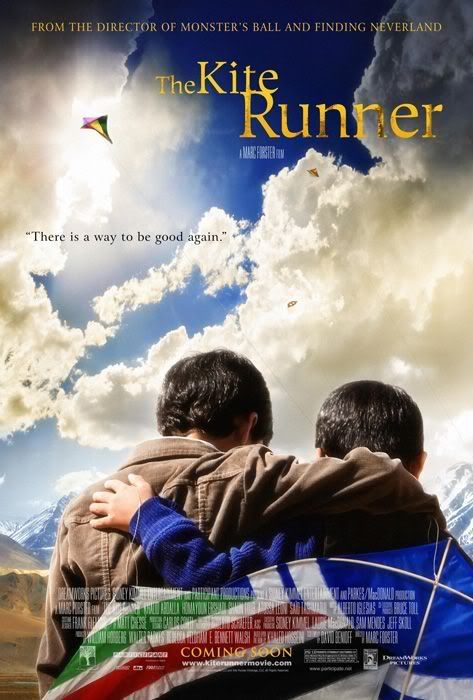The Kite Runner and Youth Without Youth


Two fine directors have released their latest projects-one of them a former master of the 60's, and 70's, and the other one a rising master. And I bet you've heard of one of them, and have seen at least two by the other. They are, of course, Francis Ford Coppola and Marc Forster. Coppola, who of course has made several landmark films like "The Godfather," "The Godfather Part II," "The Conversation," and "Apocalypse Now," hasn't made a film in eleven years since the Robin Williams starrer "Jack." He's back with the rather messy metaphysical drama "Youth Without Youth." And on the flip side, Forster, who directed "Monster's Ball," "Finding Neverland," "Stay," and my tenth favorite film of last year "Stranger Than Fiction," is back with the long awaited adaptation of the beloved novel "The Kite Runner."
I recently read "The Kite Runner" after buying a used copy of it from a man a few steps away from the IFC Center last February. I recall the incident well, as when I asked the man how much money the book cost, he replied "Five dollars." When I went into the store to break my twenty, he called after me, "Or a 40 oz. Budweiser can." I can him the five dollars. I heard so much about the book-how wonderful and amazing it was-that I wanted to make sure I had read it before seeing the film, upping my chances that I am able to read the book without an prior knowledge of what happens. This is dangerous to any film or book buff, as one is never as good as the other, even if you read the book first or watch the film first. I did the same thing earlier this year with "Feast of Love," which I might have liked as a film even I didn't read the book, and "Love in the Time of Cholera," which is just a plainly bad movie-even without the book. The days and weeks and months drove by, and I still hadn't read the book, and a week before the film was released I hastened to read the 371 pages text-not a problem, as it was an easy read.
Did I like the book, you ask? I did, very much. The last fifty pages or so were intense as anything, and even difficult to read. I was able to see the growth of the main character, Amir, and chart his physical and mental journey over the course of the thirty years that the novel goes. My only real problem was that it does lag in the middle for a while-the in-between for our character as he embarks on a new journey and as he ends another one-and that it is rather poorly written-which makes an easy read, yes, but its still sloppy. However the storytelling skills are still there, and that is exactly what I expected from Forster going into this adaptation. Besides Christopher Nolan, I don't think there is a more variety hungry director out there than Forster, who can drift from a race drama, a family drama, a metaphysical thriller, to a comedy with such ease that you'd think he's been doing this for decades. And he does a very good job behind "The Kite Runner,"-and it still works as a great story that you are at the edge of your seat waiting to see what happens next.
The film, and book for that matter, is about Amir (Zekeria Ebrahimi), a young boy living in Afganhistan in its time of peace. Without the wars and the problems that we relate it to today, before the Russians eventually overtook it in the early 80's (the inspiration for the events in the very good "Charlie Wilson's War" coming out this Friday.) Amir is happy with his father, Baba (Homayoun Ershadi), and in the novel there is a juciy father/son relationship conflict that is in the film, but you kind of have to know that its there to really chart it. They also live with their Hazara servants Ali and his son Hassan (Ahmad Khan Mahmidzada). Amir and Hassan are friends, which is dangerous because of the difference in their heritage. It leads them to be bullied by the power hungry Assef (Elham Ehsas) (who, complete with the two goons at his side reminded me a little bit too much about the Malfoy character in the "Harry Potter" books, but I suppose all villians are like that regardless of what time period.) When Assef ends up committing an act of violence on Hassan, which Amir witnesses and doesn't do anything to stop it, their friendship completely changes. Amir suddenly cannot live with himself anymore. Hassan and Amir eventually move away, and Baba and Amir move to America to escape the Russians. In America, Amir (now played by Khalid Abdalla) finds love and contentment with his father, but all that changes when he is contacted by his father's best friend back home to come back and retrieve the son of Hassan, now dead (this isn't really a spoiler as it is in the trailer and all advertisement for the film), who has been captured by the Taliban. Amir heads into this dangerous voyage to try and save the boy, but also find peace within his own mind.
Since the novel, written by Khaled Hosseini in 2003-possibly as a response to the frame of mind Americans had over Afghanistan following the September 11th attacks-is written in the first person, it is tough to translate something like that to the big screen, and I think that's where "The Kite Runner" meets most of its problems. I mentioned the father/son relationship that is one of the cores of the novel, but also I found it hard to find Amir's inner conflict following the shock that he sees concerning Hassan and Assef. In the book this was clear motivation for his eventual journey to rescue his friends son, as well as the fact that he was unable to have a child with his wife, something that is barely mentioned here but was given at least six pages to in the book. And so, since the character study portions of the novel do not fit well in the film, I have to return to my original expectations to Forster-tell a good story. And that is exactly what he does. Those who haven't read the book will certainly get strong enjoyment from this film-and flaws aside it is a good story well told, and worth telling. But to really find dimensions in the characters, and to have them leave a deeper imprint in your mind, the novel will certainly be apt at doing that. Especially a strong dramatic incident towards the end of the book which is missing from the film-the film does already run a mint 128 minutes, and this incident does come a little out of left field in the book. It might have also been a little too much. I can commend Forster for taking a stab at this, and doing quite a good job. Especially with the last scene-those who read the book will know what I'm talking about-which is a complete swell of emotion all at once-but Forster does the scene perfectly. With good storytelling, acting, and music to boot, "The Kite Runner" is a good film and nothing more. In a crowded season of several great films, this might not be at the top of the must-see list, but it is more proof that Forster will be regarded as a master one day. "The Kite Runner" can be found at the Landmark Sunshine Cinema right now, and several other locations on Friday the 21st.
And moving on from that, Francis Ford Coppola, who was once a master, might be turning into a former one, with his second dud in a row. In 1996 he directed the Robin Williams comedy/drama "Jack," about a boy of ten who ages four times his age, so he looks and feels like a forty year old man. This might not have been as painfully reviewed if Coppola wasn't at the helm-it is sometimes hard to wrap around your brain the concept that this man who directed "The Godfather" and "The Conversation" was doing this. Now he's here with "Youth Without Youth," a painfully long and executed metaphysical drama starring Tim Roth-who is always bringing good work to the table even when nobody else is. The film started promising-Coppola used a title sequence reminiscent of the classic days of cinema-and the plot is rather layered. It stars Roth as Dominic as a seventy year old professor who continues to lament the loss of his love Laura (Alexandra Maria Lara), who left him when he was young. When he is struck by lightening he is lucky to be alive, but also finds that he is young again. His doctor, played perfectly by Bruno Ganz who I like more and more with each film I see him in, is puzzled by these events and tries to find out what has happened. Dominic also now has a double, a rather suave character that smokes lots of cigarettes and can only be seen in a mirror. He also ends up becoming a completely wanted person-especially by the Nazis who want him for their own personal gain. And then suddenly, and completely out of left field, we are introduced to Veronica, a woman that looks just like his lost love, who has also been struck by lightening following a car accident, and is channeling ancient languages backwards in time. And for some reason, she will get older unless taken apart from Dominic, who wants to use her in his studies.
Before the introduction of Veronica, I kind of had a grasp of where this movie was heading. It was an interesting concept, but slowly became a confusing and muddled mess. Coppola himself stated that "[It's] the kind of movie I like to make: one that gives more as people give more of themselves to it." However when the director makes a film that distances the audiences to the point where you do not even want to give any part of you to it on the first viewing. Now Roth seems to attempt to give a layered performance here-or else he is just convinced that the screenplay contains more layers than it really does-but at times when he is delivering some of this awful dialogue I can almost see the sides of his lips trying to twitch because he can't contain his laughter. And Alexandra Maria Lara, who also delivers something considering there isn't much to take from, is a complete vision. This German beauty also starred in "Downfall" and did some great work in "Control." She's is a complete beauty. I will give credit to Coppola's cinematography, which at times is almost beautiful-especially during several of the snowy scenes towards the end. Coppola had to finance this film himself (all from the money earned on his wine-making business)- and it makes sense why-the movie has such a non-universal appeal that no studio would touch it.
Sadly, "Youth Without Youth" is a mess from start to finish-never focusing on one idea and being too scattered for me, and most other people I'm sure, to make anything out of it. It would take two hands to represent the number of walk-outs throughout this film. It can be found at the Landmark Sunshine Cinema and the Paris in NYC.
Final Grade:
The Kite Runner *** of ****
Youth Without Youth *1/2 of ****

0 Comments:
Post a Comment
Subscribe to Post Comments [Atom]
<< Home